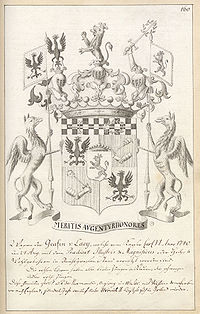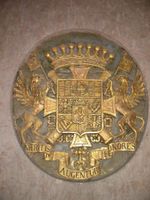
Franz Moritz von Lacy
Encyclopedia

Vienna
Vienna is the capital and largest city of the Republic of Austria and one of the nine states of Austria. Vienna is Austria's primary city, with a population of about 1.723 million , and is by far the largest city in Austria, as well as its cultural, economic, and political centre...
), was the son of Count Peter von Lacy
Peter Lacy
Count Peter von Lacy, or Pyotr Petrovich Lacy , as he was known in Russia , was one of the most successful Russian imperial commanders before Rumyantsev and Suvorov...
and a famous Austria
Austria
Austria , officially the Republic of Austria , is a landlocked country of roughly 8.4 million people in Central Europe. It is bordered by the Czech Republic and Germany to the north, Slovakia and Hungary to the east, Slovenia and Italy to the south, and Switzerland and Liechtenstein to the...
n field marshal
Generalfeldmarschall
Field Marshal or Generalfeldmarschall in German, was a rank in the armies of several German states and the Holy Roman Empire; in the Austrian Empire, the rank Feldmarschall was used...
. He served Maria Theresia, was a close friend to Joseph II, Holy Roman Emperor
Joseph II, Holy Roman Emperor
Joseph II was Holy Roman Emperor from 1765 to 1790 and ruler of the Habsburg lands from 1780 to 1790. He was the eldest son of Empress Maria Theresa and her husband, Francis I...
, and became one of his advisers. He was made a Count of the Holy Roman Empire.


Early life
His father, Count Peter von LacyPeter Lacy
Count Peter von Lacy, or Pyotr Petrovich Lacy , as he was known in Russia , was one of the most successful Russian imperial commanders before Rumyantsev and Suvorov...
, was a Russia
Russia
Russia or , officially known as both Russia and the Russian Federation , is a country in northern Eurasia. It is a federal semi-presidential republic, comprising 83 federal subjects...
n Field Marshal
Field Marshal
Field Marshal is a military rank. Traditionally, it is the highest military rank in an army.-Etymology:The origin of the rank of field marshal dates to the early Middle Ages, originally meaning the keeper of the king's horses , from the time of the early Frankish kings.-Usage and hierarchical...
, who belonged to an Irish
Ireland
Ireland is an island to the northwest of continental Europe. It is the third-largest island in Europe and the twentieth-largest island on Earth...
family, and had followed the fortunes of the exiled James II
James II of England
James II & VII was King of England and King of Ireland as James II and King of Scotland as James VII, from 6 February 1685. He was the last Catholic monarch to reign over the Kingdoms of England, Scotland, and Ireland...
. Franz Moritz was born in St Petersburg and was educated in Germany for a military career, and entered the Austrian service. He served in Italy
Italy
Italy , officially the Italian Republic languages]] under the European Charter for Regional or Minority Languages. In each of these, Italy's official name is as follows:;;;;;;;;), is a unitary parliamentary republic in South-Central Europe. To the north it borders France, Switzerland, Austria and...
, Bohemia
Bohemia
Bohemia is a historical region in central Europe, occupying the western two-thirds of the traditional Czech Lands. It is located in the contemporary Czech Republic with its capital in Prague...
, Silesia
Silesia
Silesia is a historical region of Central Europe located mostly in Poland, with smaller parts also in the Czech Republic, and Germany.Silesia is rich in mineral and natural resources, and includes several important industrial areas. Silesia's largest city and historical capital is Wrocław...
and the Netherlands
Netherlands
The Netherlands is a constituent country of the Kingdom of the Netherlands, located mainly in North-West Europe and with several islands in the Caribbean. Mainland Netherlands borders the North Sea to the north and west, Belgium to the south, and Germany to the east, and shares maritime borders...
during the War of the Austrian Succession
War of the Austrian Succession
The War of the Austrian Succession – including King George's War in North America, the Anglo-Spanish War of Jenkins' Ear, and two of the three Silesian wars – involved most of the powers of Europe over the question of Maria Theresa's succession to the realms of the House of Habsburg.The...
, was twice wounded, and by the end of the war was a lieutenant-colonel. At the age of twenty-five he became full colonel and chief of an infantry regiment.
Seven Years' War
In 1756 with the opening of the Seven Years' WarSeven Years' War
The Seven Years' War was a global military war between 1756 and 1763, involving most of the great powers of the time and affecting Europe, North America, Central America, the West African coast, India, and the Philippines...
he was again on active service, and in the first battle (Lobositz
Battle of Lobositz
The Battle of Lobositz or Lovosice also Lowositz on 1 October 1756 was the opening land battle of the Seven Years' War. Frederick the Great's 29,000 Prussians prevented Field Marshal Maximilian Ulysses Count Browne 34,500 Austrians from relieving their besieged Saxon allies during the Siege of...
) he distinguished himself so much that he was at once promoted major-general. He received his third wound on this occasion and his fourth at the battle of Prague
Prague
Prague is the capital and largest city of the Czech Republic. Situated in the north-west of the country on the Vltava river, the city is home to about 1.3 million people, while its metropolitan area is estimated to have a population of over 2.3 million...
in 1757. Later in 1757 Lacy bore a conspicuous part in the great victory of Breslau
Battle of Breslau (1757)
The Battle of Breslau was a battle fought on November 22, 1757 during the Seven Years' War. A Prussian army of 28,000 men fought an Austrian army of 84,000 men. The Prussians held off the Austrian attack, losing 6,000 men to the Austrians 5,000 men. But one day later the Prussians beat a retreat...
, and at Leuthen
Battle of Leuthen
In the Battle of Leuthen or Lissa, fought on 5 December 1757, Frederick the Great's Prussian army used maneuver and terrain to decisively defeat a much larger Austrian army under Charles of Lorraine, thus ensuring Prussian control of Silesia during the Seven Years' War.- Background :While Frederick...
, where he received his fifth wound, he covered the retreat of the defeated army. Soon after this began his association with Field-Marshal Daun
Leopold Josef Graf Daun
Count Leopold Joseph von Daun , later Prince of Thiano, Austrian field marshal, was born at Vienna, as son of Count Wirich Philipp von Daun.- Background :...
, the new generalissimo of the empress's forces, and these two commanders, powerfully assisted later by the genius of Laudon
Ernst Gideon Freiherr von Laudon
Baron Ernst Gideon von Laudon Baron Ernst Gideon von Laudon Baron Ernst Gideon von Laudon (German: Ernst Gideon Freiherr von Laudon (originally Laudohn or Loudon) (Tootzen, now Latvia, February 2, 1717 – July 14, 1790 in Nový Jičín, now Czech Republic) was an Austrian field marshal, one of the most...
, made headway against Frederick the Great for the remainder of the war.
A general staff was created, and Lacy, a lieutenant field-marshal at thirty-two, was made chief of staff (quartermaster-general) to Daun. That their cautiousness often degenerated into timidity may be admitted—Leuthen and many other bitter defeats had taught the Austrians to respect their great opponent—but they showed at any rate that, having resolved to wear out the enemy by Fabian methods, they were strong enough to persist in their resolve to the end. Thus for some years the life of Lacy, as of Daun and Laudon, is the story of the war against Prussia. After Hochkirch
Battle of Hochkirch
The Battle of Hochkirch was a battle fought on October 14, 1758 during the Seven Years' War between a Prussian army of 30,000-36,000 commanded by Frederick the Great and an Austrian army of 80,000 commanded by Marshal Leopold Josef Graf Daun...
(October 15, 1758) Lacy received the Grand Cross of the Order of Maria Theresa. In 1759 both Daun and Lacy fell into disfavour for failing to win victories, and Lacy owed his promotion to Feldzeugmeister only to the fact that Laudon had just received this rank for the brilliant conduct of his detachment at Kunersdorf. He shadowed Frederick the Great's Prussian army during the failed Siege of Dresden
Siege of Dresden
The Siege of Dresden took place in July 1760 during the Seven Years War when a Prussian force led by Frederick the Great unsuccessfully besieged the city of Dresden in Saxony....
in 1760. His responsibilities told heavily on Lacy in the ensuing campaigns, and his capacity for supreme command was doubted even by Daun, who refused to give him the command when he himself was wounded at Torgau
Battle of Torgau
In the Battle of Torgau on 3 November 1760, King Frederick the Great's Prussian army fought a larger Austrian army under the command of Field Marshal Leopold Josef Graf Daun. The Prussians won a costly victory in one of the bloodiest battles of the Seven Years' War.-Background:In August, Daun...
.
Later career
After the Treaty of HubertusburgTreaty of Hubertusburg
thumb|right|300px|Hubertusburg, WermsdorfThe Treaty of Hubertusburg was signed on 15 February 1763 at Hubertusburg by Prussia, Austria, and Saxony. Together with the Treaty of Paris, it marked the end of the French and Indian War and of the Seven Years' War. The treaty ended the continental...
a new sphere of activity was opened, in which Lacy's special gifts had the greatest scope. Maria Theresa
Maria Theresa of Austria
Maria Theresa Walburga Amalia Christina was the only female ruler of the Habsburg dominions and the last of the House of Habsburg. She was the sovereign of Austria, Hungary, Croatia, Bohemia, Mantua, Milan, Lodomeria and Galicia, the Austrian Netherlands and Parma...
having placed her son, Emperor Joseph II
Joseph II, Holy Roman Emperor
Joseph II was Holy Roman Emperor from 1765 to 1790 and ruler of the Habsburg lands from 1780 to 1790. He was the eldest son of Empress Maria Theresa and her husband, Francis I...
, at the head of Austrian military affairs, Lacy was made a field marshal, and given the task of reforming and administering the army (1766). He framed new regulations for each arm, a new code of military law, a good supply system
Logistics
Logistics is the management of the flow of goods between the point of origin and the point of destination in order to meet the requirements of customers or corporations. Logistics involves the integration of information, transportation, inventory, warehousing, material handling, and packaging, and...
. As the result of his work the Austrian army was more numerous, far better equipped, and cheaper than it had ever been before. Joseph soon became very intimate with his military adviser, but this did not prevent his mother, after she became estranged from the young emperor, from giving Lacy her full confidence. His activities were not confined to the army. He was in sympathy with Joseph's innovations, and was regarded by Maria Theresa as a prime mover in the scheme for the partition of Poland
Poland
Poland , officially the Republic of Poland , is a country in Central Europe bordered by Germany to the west; the Czech Republic and Slovakia to the south; Ukraine, Belarus and Lithuania to the east; and the Baltic Sea and Kaliningrad Oblast, a Russian exclave, to the north...
. But his self-imposed work broke down Lacy's health, and in 1773, in spite of the remonstrances of Maria Theresa and of the emperor, he laid down all his offices and went to southern France. On returning he was still unable to resume office, though as an unofficial adviser in political and military matters he was far from idle.
In the brief and uneventful War of the Bavarian Succession, Lacy and Laudon were the chief Austrian commanders against the King of Prussia
Frederick II of Prussia
Frederick II was a King in Prussia and a King of Prussia from the Hohenzollern dynasty. In his role as a prince-elector of the Holy Roman Empire, he was also Elector of Brandenburg. He was in personal union the sovereign prince of the Principality of Neuchâtel...
, and when Joseph II at Maria Theresa's death, became the sovereign of the Austrian dominions as well as emperor, Lacy remained his most trusted friend. More serious than the War of the Bavarian Succession was the Turkish war which presently broke out. Lacy was now old and worn out, and his tenure of command therein was not marked by any greater measure of success than in the case of the other Austrian generals. His active career was at an end, although he continued his effective interest in the affairs of the state and the army throughout the reign of Joseph's successor, Leopold II
Leopold II, Holy Roman Emperor
Leopold II , born Peter Leopold Joseph Anton Joachim Pius Gotthard, was Holy Roman Emperor and King of Hungary and Bohemia from 1790 to 1792, Archduke of Austria and Grand Duke of Tuscany from 1765 to 1790. He was a son of Emperor Francis I and his wife, Empress Maria Theresa...
. His last years were spent in retirement at his castle of Neuwaldegg near Vienna
Vienna
Vienna is the capital and largest city of the Republic of Austria and one of the nine states of Austria. Vienna is Austria's primary city, with a population of about 1.723 million , and is by far the largest city in Austria, as well as its cultural, economic, and political centre...
.
Ancestry
See also
- Irish military diasporaIrish military diasporaThe Irish military diaspora refers to the many people of either Irish birth or extraction who have served in foreign military forces, regardless of rank, duration of service, or success....
- Irish regiments

